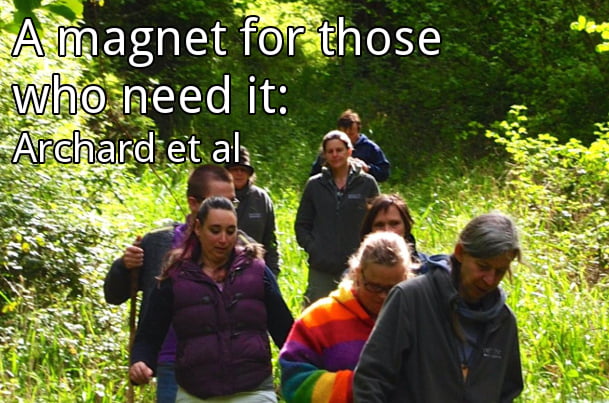A new piece of research has shed light on the valuable work of a growing number of small woodland-based organisations across Britain, which are helping people in need find respite and benefit in nature – and helping the woods in the process.
Woodland enterprise and social need
Across the UK, a growing number of woodland-based social enterprises are acting on a widely-understood but seldom-manifested knowledge: that there is a powerful synergy between the natural world and social action. They are using a connection to nature as a tool to help people with psychological, educational, social or financial needs, deal with the challenges in their lives. And they are generally doing this on a shoestring, within tiny organisations driven by personal commitment and hard physical and emotional effort.
This article is based on a research project commissioned by Making Local Woods Work (MLWW), an initiative led by the Plunkett Foundation and funded by the Big Lottery Fund, focused on supporting and developing woodland social enterprises (WSEs) across the UK (1). The research was carried out by a team combining social research capacity with practical knowledge of delivering woodland-based activities. The study explored the relationships between WSEs and the variety of people in their local communities who can be described as being ‘in-need’.
A mixed-methods approach was taken to the research, with quantitative and qualitative elements. 159 woodland-based organisations were identified, with a questionnaire survey generating 65 full responses, from all parts of the UK albeit with a majority from England. Further dialogue came from a Facebook group discussion, telephone interviews, and focus groups. The study chose to focus on ‘true’ woodland social enterprises, i.e. organisations whose activity is mostly in woodland settings, are constituted in their own right (not just a project of a larger organisation), with social (rather than purely profit-making) aims, and gaining at least some of their income from trading.
Who’s needs, and how to address them
The definition of ‘in-need’ used by WSEs includes practical, psychological, financial and educational need, and there is a large overlap between these categories. Overall the most common focus is on adults with mental health issues, children with additional needs, people on very low incomes and adults with a history of alcohol or substance misuse. WSEs are working in many cases with more than one kind of in-need group.
There is no single overarching type of approach being used by WSEs for their engagement with in-need groups. In practice the approach borrows from a number of recognised categories, including Ecotherapy (i.e. a deep connection to nature with therapeutic aims); Forest School (learner-centred activity, in a non-judgmental learning setting, used with adults as well as with children and young people); environmental arts projects; approaches based on the Five Ways to Wellbeing (connect, be active, take notice, keep learning, give) (2); teaching transferable skills (e.g. from fire-lighting, learning patience, team work, perseverance); and using the John Muir Award as a structure (the four challenges of Discover, Explore, Conserve and Share) (3). At its heart however, the approach is always about being together, in a natural setting, around a fire, doing the practical things necessary for being in a group. Specific activities include woodland management, craft making, play, cooking and eating together. Provision may be in short blocks of weekly sessions or longer-term programmes.
Woodland social enterprises by definition combine ‘people’ and ‘environment’ purposes in their objectives, and vary widely in the emphasis they place on the two. Some start with the woodland, being primarily focused on the sustainable management of their woodland and increasing biodiversity. For these, catering for in-need groups can be a means to achieve their woodland ends, albeit while recognising the added benefits which accrue to the individuals involved in the process. At the other end of this spectrum some WSEs begin with a social purpose, and simply use the woodland as a setting that works particularly well for pursuing their objectives with in-need groups. Most WSEs occupy a mid-point on this spectrum, desiring to combine woodland and social purposes. During the focus groups people said how important it is to be able to combine benefit for people, with benefit for the woodland.
Big issue, small resources
The most common legal structure of the WSEs in the study is a Community Interest Company, and the majority have an annual income below £100,000. Most rely on grants or local authority contracts to fund their work with those in need. A majority of their woodland settings are in a rural location, and the woodlands tend to be leased, or owned by a member of the group.
The personal commitment of lead individuals is a key driver in WSEs, often despite poor remuneration, though this presents issues for sustainability and succession. Most staff are working as self-employed freelancers rather than being employed on payroll. The operation of a WSE as a business, together with work with in-need groups, demands a wide range of skills and aptitudes. WSEs’ work with in-need groups is most commonly run by female staff, whereas a high proportion of clients are male – WSEs are successfully supporting men in their work, which many wellbeing organisations struggle to do.
The special qualities of woodland – its peacefulness, its provision for productive work, its wildness and its informality – are all seen as important by WSEs for the work being done. Work with in-need groups can also offer a way for neglected woodlands to be enhanced for wildlife and amenity, yet while affordable access to land is crucial to their work, the variety of formal, informal and ‘nomadic’ arrangements amongst WSEs suggests an uncertain foundation.
Dependency on volunteers and ‘free time’ from staff can mask financial frailty, and support to people in need is not likely to be sustainable in the long term, given short-term grant cycles. Few WSEs are yet funding their work substantially through income generation from their social enterprise. Some newer groups are working almost entirely on a voluntary basis, while some longer-established groups are becoming confident to charge more realistic rates for session delivery. Addressing these financial challenges requires a suite of approaches, including broadening business models to enable wider revenue-generating activity, together with improving access to grant sources.
Being heard, and being helped
The diversity of approaches, emphases and organisational structures amongst WSEs means they may find it difficult to find a natural home within any one sector. Viewed from the perspective of conventional social, educational and health services, WSEs may appear too unusual to be included in professional networks. From the perspective of the forestry sector, they may appear too small-scale to be acknowledged for doing ‘proper’ forestry. And from the perspective of the nature conservation sector WSEs may appear to be of little relevance, as they are not driven primarily by conservation objectives. As with all organisations which occupy ‘the edge’, WSEs may therefore struggle to be heard. They represent a young field of work, forging a new approach that is seeking recognition and mechanisms to engage with those in positions of power. Yet they are enthusiastic about networking with peer groups, being naturally collaborative and happy to learn from each other.
The research found that the main barriers and challenges for WSEs in pursuing work with in-need groups revolve around funding, capacity to maintain and develop businesses, practical issues in
using outdoor settings, and potential burn-out amongst key staff. These organisations are doing valuable work, and building bridges between nature and social need, as well as between different arms of the health, social and land-managing sectors. But to continue to thrive and evolve, as adaptable, locally-rooted community organisations, they need support. In this regard the researchers have made a number of recommendations to MLWW and its partner organisations, focused on ways to involve WSEs in planning future provision, enabling better networking and collective training, creating a dialogue with funders, woodland owning bodies, the NHS and other parties, and helping establish common standards. Woodland social enterprises represent a truly bottom-up approach to tackling environmental and social issues in a holistic way. The spark they have created deserves to be nurtured into a sustained and warming fire.
References
1. See https://makinglocalwoodswork.org/what-is-woodland-social-enterprise/. 2. Five Ways to Wellbeing from NEF https://neweconomics.org/uploads/files/d80eba95560c09605d_uzm6b1n6a.pdf 3. John Muir Trust: https://www.johnmuirtrust.org/john-muir-award 4. A selection of woodland social enterprises: Beechbrae, West Lothian, http://beechbrae.co.uk; Plas Derw, Flintshire, http://plasderwforestschool.co.uk; Working Woodlands Cornwall, https://workingwoodlandscornwall.com; Courage Copse Creatives, Devon, http://www.local-devon-biochar-charcoal.co.uk; Neroche Woodlanders, Somerset, http://www.youngwood.org.uk; ARC CIC, Warwickshire, http://www.arccic.co.uk.
JENNY ARCHARD, SARAH TARAGON, GAVIN SAUNDERS AND KATH PASTEUR
Jenny Archard and Gavin Saunders run Neroche Woodlanders in Somerset; Sarah Taragon runs Clarity CIC in Devon; and Kath Pasteur runs ARC CIC in Warwickshire.
Contact the author


